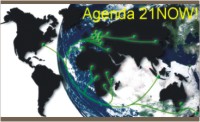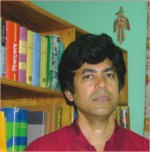Feature
Agenda 21 Now! Experiencing Internet Conference
Subrata Kumar Das
 9 May 2007 has been one of the very memorable days in my professional life. Being a teacher I have been engaged in motivating students in ICTs for long and on the above mentioned day, I got the opportunity to get a new experience. It is attending an internet conference. With some 1000 students and educators from about 70 countries I was online round the clock on the day and learnt how to help students work together in the globalised world with the main ideal 'One World, One Globe'. 9 May 2007 has been one of the very memorable days in my professional life. Being a teacher I have been engaged in motivating students in ICTs for long and on the above mentioned day, I got the opportunity to get a new experience. It is attending an internet conference. With some 1000 students and educators from about 70 countries I was online round the clock on the day and learnt how to help students work together in the globalised world with the main ideal 'One World, One Globe'.
What is Agenda 21?
In 1992, 179 countries of the world adopted a paper in the UN's world summit that took place in Rio de Janeiro, Brazil. The paper, an agenda, was a plan for the 21st century. This paper was called Agenda 21. The general idea of the paper concentrated on how to live sustainably.
What is Agenda 21 Now Internet Conference?
The idea of Agenda 21 Now dates back to 1996 when internet started to notably reach a huge number of schools in Germany. Some educators who had associated themselves with internet began to think to utilise it in education sector along with its other possibilities. At last Martin Jarrath of Anna-Schmidt-School, Frankfurt and some of his German ASPnet (Associated School Project network) fellow teachers sat in a meeting in September 1998, trying to find ideas for an action day on education for sustainability in 2000. It was with a view to implementing the agenda for sustainability. Right now, not next year, not tomorrow, but now.
Any student of 14+ age having internet access can register for the conference. Educators are also welcome. The only language of the conference is English. After the registration, the participant is given a user name and a password. Only the registered participants are allowed to study and edit the interactive pages. They can share their ideas as is done on wikipedias. And at last they can participate in the conference on the previously fixed date. This year the date was 9 May. The conference started at 00.00 UTC (Coordinated Universal Time) i.e. 06.00 in the morning in Bangladesh and ended at the same time the next morning. This year's theme was Globalisation on the site www.agenda21now.org .
Main Ideas of Agenda 21 Now:
1. To introduce the Internet as a very useful means of communication into non-technical subjects such as languages (esp. English), social sciences and geography.
2. To focus on the contents, not on the technical aspect. If the Internet is so useful, we should be able to make use of it for international co-operation on such topics as education for sustainability.
3. To combine the new technical possibilities with traditional methods of intercultural learning: giving students the opportunity to get into personal contact to students from other countries and intensely co-operate with them on certain topics for a certain time.
4. To do something sustainable, if possible. To take effects that last for more than the time of the activity itself, measures have to be taken to provide this (to really make a difference to an ordinary chat).
Early Conferences:
The first conference took place on 5 June 2000 in which the total number of students was only some 350. In the second conference, held on World Water Day March 22, 2001 where 1200 participants from 40+ countries participated. The third conference with a special title 'Floods and Deserts' took place on 25 April 2002 with 900 students from 60 countries. On 3 April 2003 was the fourth conference with a title 'Borders and Diversity'. Since the third conference the organising team has expanded to two schools (Anna-Schmidt-School in Frankfurt and new: Comprehensive School Kandel in southwest Germany). Since the 2004 conference there are six schools cooperating to run 'Agenda 21 NOW!': Anna-Schmidt-School(Frankfurt am Main), Kandel Comprehensive School (Kandel) and Hindenburg-Gymnasium Trier in Germany, Amtgymnasium Sønderborg in Denmark, Upper Secondary School No. 6 in Gdansk, Poland and Tartu Tamme Gymnasium in Tartu, Estonia.
With the passing of the years, the number of participants and countries are also increasing.
Agenda 21 Now 2007:
The more the hands of the clock were rushing to make it six, the more there had been the increase of excitement. When it was 6 in Bangladesh, the link of a new page named 'conference' opened in the website. And instantly started the threads and the posting on the themes as well.
Panel of Experts:
This year the panel of experts included 2 from Germany, 1 from New Zealand and 1 from Bangladesh. The German experts were: Ute Gronwoldt and Franz Schurig, while Jofn Lockley hails from New Zealand, and I, the present contributor got the opportunity to monitor and guide the students online.
Participants:
 This year is about one thousand students from about seventy countries registered for the conference. Very amazingly I got students from some Bangladeshi institutions. Meeting students from Chittagong, Commila or Gazipur was really exciting. Previously I thought that only three students from Birshrestha Munshi Abdur Rouf Rifles College would participate, as I myself motivated, Sizan Darain, Shakhawat Hossain of Anik Rahman to take the challenge, but the presence of others from across the country made me enthusiastic. I met many students of Secondary, higher secondary, and even of graduation and post graduation levels in the conference. Meeting people from Afganistan, Indonesia, Japan, India, Kanada, Poland, Uzbekistan, Canada, Germany contributed hugely to my learning also. I got a more practical experience on how people of non-English countries write English, how less or more do the people of even the developed countries know about global worming etcetera, etcetera. This year is about one thousand students from about seventy countries registered for the conference. Very amazingly I got students from some Bangladeshi institutions. Meeting students from Chittagong, Commila or Gazipur was really exciting. Previously I thought that only three students from Birshrestha Munshi Abdur Rouf Rifles College would participate, as I myself motivated, Sizan Darain, Shakhawat Hossain of Anik Rahman to take the challenge, but the presence of others from across the country made me enthusiastic. I met many students of Secondary, higher secondary, and even of graduation and post graduation levels in the conference. Meeting people from Afganistan, Indonesia, Japan, India, Kanada, Poland, Uzbekistan, Canada, Germany contributed hugely to my learning also. I got a more practical experience on how people of non-English countries write English, how less or more do the people of even the developed countries know about global worming etcetera, etcetera.
Thread Titles:
The whole conference had been conducted in three rooms under three titles which were: Economy, fair trade and communication; global warming, a global ecology; and the people: population, societies, poverty.
A total of some four hundred threads were placed on which discussions went on. On those themes about three thousand postings were done during the 24 hours. It is true that some threads did not take expected themes, possibly because some students could not understand how to enter the discussions. Some students even started talking very personal things, irrelevant to the main theme of globalisation. But many of the threads were worthful to remember. Those who could not do well will certainly learn how to do better in the following years.
What more could be done:
Agenda 21 Now conference is certainly very exciting, educative and helpful. I am sure the people who are engaged in it have to work so hard with so much patience! The worthy people who work behind the scene have to give so much time and energy! I congratulate Martin Jarrath along with the whole team including the moderators.
But it seems it could give something more to the teenage learners. The following are my humble observations only, might be those would demand too hugely to be implemented:
1. All the information of the participants should have been within the access of the registered participants before and after the conference. The absence of it created a huge loss: people who became closer during the 24 hours time of the conference lose the connection to commutate any further. Though Conference after the Conference will help revive some, but certainly not all.
2. The conference materials could have been online, without any editing opportunity, even after the conference that at least the registered participants could see what s/he had posted and thus could learn what s/he should not have done. This could enormously contribute to their learning of technology, language (English) and ideas on globalization.
3. In the posting areas there should have been options that one can check spelling and language and then post.
4. Participants who could not interact very successfully could get time to find out the reasons of their failure, or who interacted well could find ways how to do better.
5. Before, during and immediately after the conference, there could have been enough information regarding the participants and other related things in the 'News link' of the home page that viewers who are not registered could see those and get informed.
6. Posting on the Interactive page should be done through the editor.
But even after all those drawbacks. I must speak aloud of the Conference. Let the Conference run every year, let it draw more and more people, let it pose as a great means of education in the forth coming days.
To email Subrata Kumar Das: subratakdas@yahoo.com
Tease your brain
( if you have any !?!)
Who built the Taj Mahal?
- Chenghiz Khan
- Emperor Ashoka
- Bayram Khan
- Emperor Shahjahan
- Emperor Akbar
- Sher Shah
Quiz Answer : Emperor Shahjahan
| 